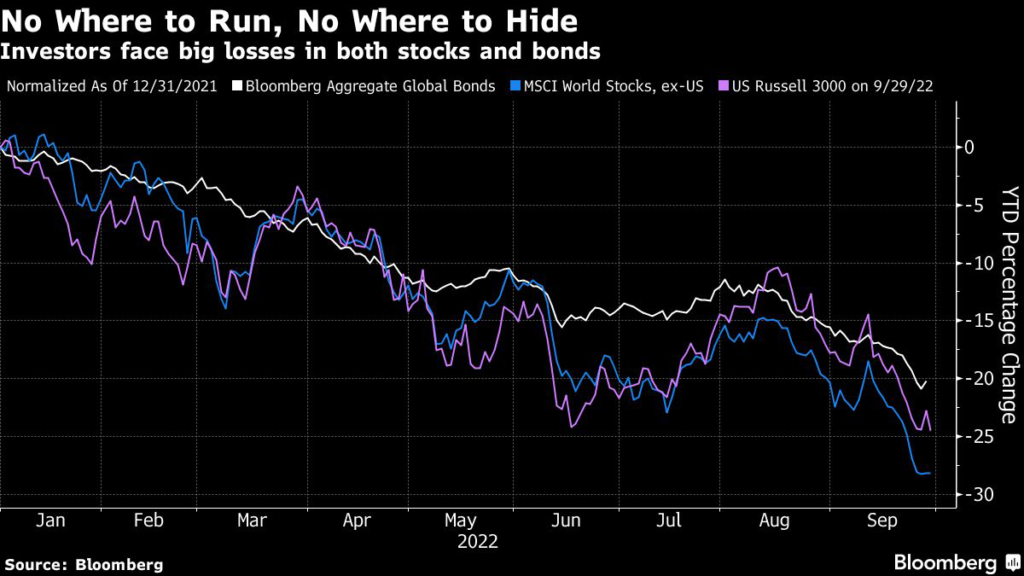Stocks dropped in Asia after another plunge on Wall Street as the prospect of higher interest rates and turmoil in Europe stoked fears of global recession.
(Bloomberg) — Stocks dropped in Asia after another plunge on Wall Street as the prospect of higher interest rates and turmoil in Europe stoked fears of global recession.
An index of the region’s equities headed for its seventh straight weekly loss and a monthly slump that would be the biggest since 2008. US futures fluctuated after the S&P 500 slid more than 2% to the lowest in almost two years.
The dollar swung between gains and losses versus major currencies including the pound as investors weighed risks emanating from the debt crisis gripping the UK. Treasury yields were little changed after days of being whipsawed.
The Cboe Volatility Index has been well over 30 for almost all of this week, reflecting heightened worry among equity investors. Another group of Federal Reserve officials struck a hawkish tone, German inflation topped 10% and the UK government’s tax plan continued to weigh on market sentiment.
The Bank of Japan boosted its planned bond purchases at a regular operation on Friday as it sought to cap upward pressure on yields, while Prime Minister Fumio Kishida instructed his government to come up with an economic stimulus package by the end of October.
The offshore yuan weakened and was at risk of further depreciation next week, when China goes on a one-week holiday, leaving Beijing unable to guide investor expectations with its daily reference rate.
“Our assumption is that the Chinese government will continue to fight this administratively as long as they can before they have to step in with direct intervention and have to start selling down US reserves,” Charlene Chu, senior analyst for Autonomous Research, said on Bloomberg Television.
Amid the economic pressure, China’s central government shifted to allow some cities to lower their mortgage rates for first home purchases in its latest bid to help the country’s struggling housing market.
The tech-heavy Nasdaq 100 dropped almost 4% during the session after St. Louis Fed President James Bullard said investors have now understood that they can’t escape additional rate hikes in coming months. The index was dragged down by Apple Inc., which fell after a rare analyst downgrade from Bank of America warning of weaker consumer demand for its popular devices.
How much damage is a strong dollar causing? That’s the theme of this week’s MLIV Pulse survey. It’s brief and we don’t collect your name or any contact information. Please click here to share your views.
Key events this week:
- Euro zone CPI, unemployment, Friday
- US consumer income , University of Michigan consumer sentiment, Friday
- Fed’s Lael Brainard and John Williams speak, Friday
Some of the main moves in markets:
Stocks
- S&P 500 futures added 0.1% as of 7:16 a.m. London time. The S&P 500 fell 2.1%
- Nasdaq 100 futures gained 0.1%. The Nasdaq 100 fell 2.9%
- Japan’s Topix index fell 1.8%
- South Korea’s Kospi index slipped 0.8%
- Hong Kong’s Hang Seng Index was up 0.1%
- China’s Shanghai Composite Index fell 0.3%
- Australia’s S&P/ASX 200 Index dropped 1.2%
- Euro Stoxx 50 futures surged 0.2%
Currencies
- The Bloomberg Dollar Spot Index fell 0.2%
- The euro was up was little changed at $0.9818
- The Japanese yen was steady at 144.49 per dollar
- The offshore yuan was at 7.0882 per dollar
Cryptocurrencies
- Bitcoin fell 0.3% to $19,448.03
- Ether fell 0.5% to $1,331.46
Bonds
- The yield on 10-year Treasuries slipped two basis points to 3.77%
- Australia’s 10-year bond yield was steady at 3.94%
Commodities
- West Texas Intermediate crude decreased 0.1% to $81.13 a barrel
- Spot gold climbed 0.3% to $1,665.50 an ounce
More stories like this are available on bloomberg.com
©2022 Bloomberg L.P.











